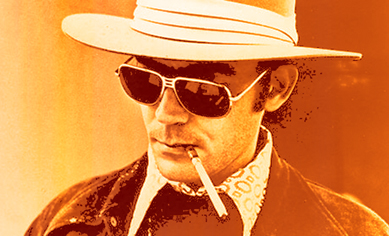
Hunter S. Thompson
The first time I met Hunter Thompson he handed me a quiver of four-foot roman candles and said “Hold this.”
I did and he lit them.
We were in Palm Springs, standing poolside at an ultra private estate, there for a Rolling Stone Magazine board meeting. Hunter had just secretly spiked the fruit punch with LSD. I don’t remember much about the rest except that it was supposed to be some kind of bonding ritual set up by our editor-in-chief Jann Wenner because Hunter and I were about to do a book together.
Hunter hated editors
Hunter had had bad experiences getting rejected, lied to, his work eviscerated or twisted to shreds by what he described as dirt bag imbecile hacks posing and preening as publishing pundits. So by the time I became his book editor for Fear and Loathing on the Campaign Trail 1972, he treated me at first like some kind of capitalist henchman or worse, a sleazy highway patrolman who had pulled him over for speeding, and wanted to put him in jail for thirty days.
But by August of 1972, he couldn’t avoid me.
We had to be first and best on the market
Straight Arrow, the books division of Rolling Stone, had a contract with Hunter to expand his irregular series of articles on the Nixon vs McGovern presidential campaign into a book that would trump Theodore White’s best-selling series on The Making of the President. We were determined to be first and best on the market that campaign season. Us, the underdog lefty radical youth culture paper of record. Our version of democracy at work.
So when Hunter went into a tailspin after Nixon’s victory and appeared paralyzed, unable to write any more, I sent him a letter — no email in those days — suggesting we get together face-to-face and see if I could help him finish the book.
“Your hair will be cotton-white”
“I’ve never been much of a Christian, Alan,” he fired back in a handwritten red streaked epistle, “but I’m Christian enough to warn you that if you come anywhere near me, your hair will be cotton-white by Groundhog Day. A lot of people in publishing have knee-calluses, but not many can say what it’s like to scrape scar-tissue off the bottom-side of their hip-bones – so you might be a pioneer, of sorts, in that field.”
Not exactly a welcoming attitude. But we had a deadline to meet.
Stay tuned for part two.
James,
Hunter could be difficult. Monumentally selfish, nasty about any weakness or hesitation of those he was dealing with or wanting something from, curt and insensitive to the point of cruelty, famously mysogynistic, racist, anti-semitic, and loutish, and gross when intoxicated, loud, falling down, throwing up.
He could also be extremely charming, articulate, wickedly funny, intellectually stimulating, and vulnerable late at night, in the dark, on the phone, reminiscing and confessing to painful isolation, loneliness, childhood weaknesses, and secret fears.
He was awful and deeply annoying, but never dull.
That’s some bad craziness right there – something that always puzzles me about Thompson is that although I can’t help but have some kind of schoolboy admiration for him, being a symbol of rebellious journalism and counter-culture etc., I can’t help but feel that, a lot of the time, he must have been something of an asshole to be around. Very interesting post – I’m heading straight on to part two.
Thank You
Ha Ha. Funny stuff.
thanks for posting this up here, Mr Rinzler it’s a pleasure to read.